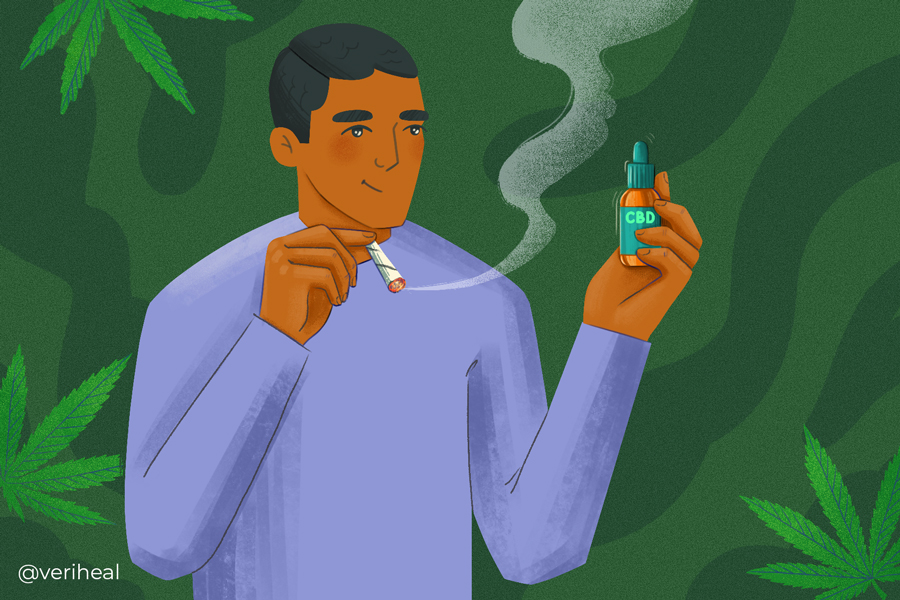There are many misconceptions about cannabis use, and a team of British and Australian researchers recently demystified one of them. Based on the findings of a study published on Nov. 16, 2022, in the journal Neuropsychopharmacology, inhaling cannabidiol (CBD) with tetrahydrocannabinol (THC) did not shield study subjects from the short-term effects of a THC “high.”
Some research has indicated that CBD may relieve some negative side effects associated with delta-9 THC, including delusions, hallucinations, and memory/attention changes. However, a growing body of research has found no direct impact of CBD on the effects of THC.
Researchers failed to dig up any proof that CBD decreases the enjoyable or negative effects of THC. Conversely, separate research has hypothesized that CBD may mitigate the mind-altering effects of THC. Researchers tested various ratios of CBD to THC to determine how the two cannabinoids react inside the body after inhalation.
To paint a clearer picture of CBD’s influence on THC consumption, large-scale studies must be carried out in the future. In 2020, cannabis consumers around the world spent $415 billion on THC-rich products. The global CBD oil market, on the other hand, is predicted to inflate from $967.2 million in 2020 to $5.3 billion in 2025.
CBD’s Impact on THC Consumption: What Did the Study Entail?
Researchers recruited 46 healthy volunteers between the ages of 21 and 50 years old for the study. Each study subject had previously used cannabis, but not more than once weekly during the past year. Four experiments were conducted, with each involving cannabis vapor inhalation. Participants consumed vaporizable cannabis with 10 milligrams of THC blended with varying levels of CBD (0 mg, 10 mg, 20 mg, or 30 mg).
According to study author Amir Englund, Ph.D., a research fellow at King’s College London’s Institute of Psychiatry, Psychology & Neuroscience, the aforementioned CBD-to-THC ratios were selected because they represent the most common types of cannabis products used for recreational purposes.
Once cannabis was used, participants engaged in a number of tasks to assess the temporary effects of THC and CBD on cognitive performance. Additionally, the study subjects were assessed on their level of pleasure. “Psychotic symptoms”, including conceptual disorganization, delusions, grandiosity, hallucinations, hostility, hyperactivity, and suspiciousness, were also measured by the researchers.
Why You Should Get Your Medical Marijuana Card
Veriheal has satisfied millions of patients nationwide by giving them access to these benefits
- Larger purchase limits
- Peace of mind
- Enhanced legal protection
- Access to higher potency strains
- Save up to 25% on cannabis purchases
- Skip the line at the dispensary
Following CBD and THC inhalation, study subjects experienced the short-term impacts of THC. Additionally, researchers found that THC consumption amplified pleasure levels when the THC was consumed while indulging in chocolate and listening to music. One of the key takeaways from the study was that participants coughed more as they consumed higher levels of CBD.
Study Limited by Absence of Placebo
The study into CBD’s impact on THC consumption was limited by the fact that no placebo condition was included. Had a placebo condition been included, study subjects would have inhaled vapor without THC or CBD—a technique that would have enabled researchers to compare the effects of vapor inhalation with the consumption of THC alone.
“Like much psychedelic research, placebo comparisons become difficult because the vast majority of people will be relatively certain if they’ve had the drug or not since the intoxication is quite pronounced,” said Englund, who noted that he and his colleagues are interested in carrying out future studies to pinpoint what THC dosages spark side effects such as anxiety, memory problems, and paranoia. “This will give users practical information about how to avoid unwanted effects,” he added.
After reviewing the study results, the director of the UCI Center for the Study of Cannabis in Irvine, CA, Daniele Piomelli, told reporters at Healthline that the study was well executed. However, he disagreed with the researchers’ classification of THC’s effects as “psychotic.”
“There is no evidence that if you and I were to smoke pot that we would be psychotic. We would be high. We would be stoned. But we would not be psychotic,” he stated.
On the other hand, he drew attention to the fact that there is proof of adolescent cannabis use—especially high-dose consumption—increasing the risk of psychotic episodes occurring later on in life. However, this differs from the short-term effects experienced by the majority of cannabis consumers.
“Cannabis has certain effects. Some people may like them, some people may not,” Piomelli said. “As long as you’re not harming other people or making your own life problematic, I don’t think we should say that you’re experiencing psychosis.”
His views are shared by many researchers, with a 2016 study titled, “Cannabis and Psychosis: a Critical Overview of the Relationship” highlighting evidence that “cannabis does not in itself cause a psychosis disorder.” Further research is required to determine the combined effects of CBD and THC.
Author, Share & Comments















